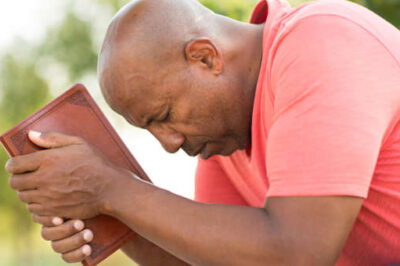In the wake of the latest shooting in Uvalde, Texas, many Christian leaders have called for Christians to pray. For some, prayer has become an empty ritual that conveys a sense of apathy and detachment.
We pray and, having done so, absolve ourselves of doing more. Yet faithful prayer is not empty or passive. It is not an excuse to ignore the world’s suffering. Rather, it is a means of acknowledging that the world is broken beyond our fixing.
In suggesting that the world is broken beyond our fixing, I am not suggesting that we give in to chaos. Rather, I am suggesting that our efforts have been, are, and always will be inadequate. We can only hope to manage brokenness and obstruct evil.
Christians don’t pray because we believe prayer will magically solve the problems we face. We pray because in a world so broken that only God can fix it, we find it necessary to call upon God as we wait for Him to make right what has gone so wrong.
In addition to prayer, Christians in a democracy often vote and lobby to effect change. We do so because in certain circumstances, we have opportunities to restrain evil through policy or regulatory action. This mix of activities might suggest that Christians care about one issue more than another.
As editorial cartoonist Ann Telnaes suggests in her piece titled “Thoughts and Prayers, Again,” Christian action in relation to abortion has often involved a more active, public political posture than has Christian action over school shootings. However, abortion and school shootings can’t be dealt with in the same manner.
While abortion and school shootings both concern the sanctity of life, the role of legislation and government action are necessarily different. I imagine, for instance, that Christians would be similarly active in pressing for policy changes were school shootings to become legal.
That said, regulatory action may reduce the possibility of mass shootings; however, senseless murder is not something we can control. While stricter gun control laws might cause the number of mass shootings to diminish, we would likely continue to be faced with the problem of murder. To suggest that murder is likely to continue regardless of the technologies available to accomplish the act is not to suggest that regulatory matters regarding gun control are of no consequence.
It seems to me that, regardless of the policies for which one might advocate, regulatory action will never be sufficient to eliminate sin. As such, we must recognize that prayer bridges the gap between the incomplete capacities of our political system to restrain evil and the time when God will make all things new. In prayer, we look beyond the insufficient, yet important, legal and political decision making to a future state in which God will restore order through a full restoration of His creation (Rev. 21:1-4).
Do I believe that our political leaders need to act? Of course. Our political leaders are to align our nation as closely as possible with the order already established by God. Do I believe that our political leaders’ actions will fix the world? No. To believe that our political leaders can fix the world would make prayer—and, more importantly, God—superfluous. Political leaders don’t fix; they manage. They participate in the unenviable task of maintaining order in a broken, chaotic world.
To suggest that prayer is insufficient is to (1) recognize rightly that many Christians use prayer as an excuse not to practice “pure and undefiled” religion “before God, the Father” (Jas. 1:27, MEV), and (2) suggest that God either does not exist or is as powerless as human beings to confront evil. If what Christians mean when they say “I’ll pray for you” is “I wish such-and-such would not have happened, and I hope my empathy gives you some comfort because there is nothing else I or anyone else (including God) can do,” the world is right to question the efficacy of prayer.
When “I’ll pray for you” is no more potent than a “We Stand With Uvalde, TX” billboard, offering “thoughts and prayers” becomes a quaint expression of solidarity that we say before going about our business and forgetting the tragedies of the day.
For God’s people to commit to prayer is not some polite idea. It is a radical moment affirming that we (1) are incapable of fixing a broken world and (2) need God to guide us as we wait for Him to make all things new. When we act apart from prayer, we assume that somehow the world is no longer beyond our fixing.
Prayer is not an excuse to do nothing but pray, though at times prayer may be our only option. It is always right to pray, yet prayer is not necessarily an isolated activity. As we see opportunities to be with those who have suffered loss, or to press our political leaders to leave partisanship behind to cultivate order, we should do so.
Compassion and service travel with prayer. In service, we walk with those who are suffering even if we cannot alleviate their suffering. As I note in Thinking Christian, “Christians will leave the world broken, perhaps more broken despite our faithful efforts … within it. We do not faithfully convey God to the world by fixing the world” but “by continuing to be faithful as we confront a world so broken only God can fix it.” {eoa}
Dr. James Spencer currently serves as president of the D.L. Moody Center, an independent nonprofit organization inspired by the life and ministry of Dwight Moody and dedicated to proclaiming the gospel and challenging God’s people to follow Jesus. Dr. Spencer’s book titled Useful to God: Eight Lessons from the Life of D.L. Moody was released in March 2022. He previously published Thinking Christian: Essays on Testimony, Accountability, and the Christian Mind as well as co-authoring Trajectories: A Gospel-Centered Introduction to Old Testament Theology.
Read articles like this one and other Spirit-led content in our new platform, CHARISMA PLUS.








Leave a Comment
You must be logged in to post a comment.